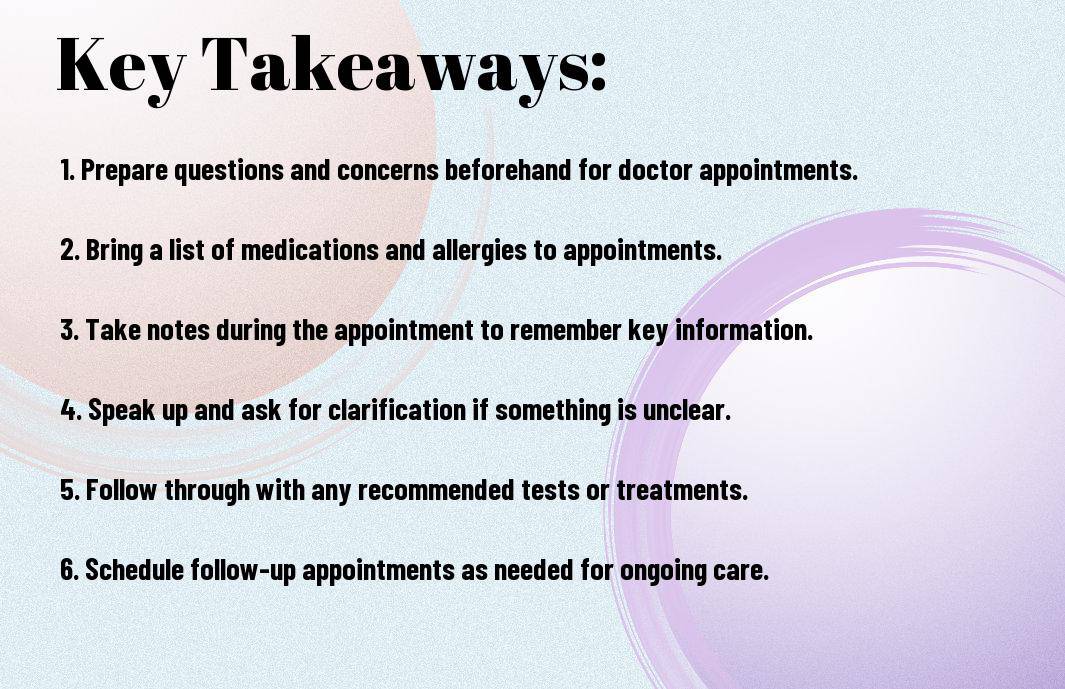Visiting the doctor can be a daunting experience for many individuals, especially those with chronic conditions or complex health issues. However, with the right strategies in place, medical appointments can be effective and successful. In this blog post, we will discuss various strategies and tips to help you make the most out of your doctor visits. From preparing a list of questions and concerns to actively participating in the conversation with your healthcare provider, we will cover it all. Additionally, we will highlight the importance of being honest and transparent about your medical history and symptoms to ensure accurate diagnosis and treatment. By implementing these strategies, you can ensure that your doctor visits are not only productive but also contribute to your overall health and well-being.
Key Takeaways:
- Be prepared: Make a list of questions and concerns, bring along relevant medical records and medications, and arrive early for your appointment.
- Communicate effectively: Clearly articulate your symptoms, concerns, and medical history to your doctor, and ask for clarification if you don’t understand something.
- Follow-up and follow through: If your doctor recommends further tests, treatments, or lifestyle changes, make sure to follow through and schedule any necessary follow-up appointments.

Preparation Strategies
Before your doctor’s appointment, it’s essential to prepare thoroughly to make the most of your time with the doctor. Proper preparation can help ensure a successful and efficient visit. Here are some strategies to help you prepare for your next medical appointment.
Before Your Appointment: Reviewing Your Medical History
Before your appointment, take the time to review your medical history. This includes any previous diagnoses, surgeries, medications, and family medical history. Understanding your medical history will help you 5 Ways to Make the Most of Your Doctor’s Appointment and allow you to provide the doctor with accurate and relevant information. Highlight any significant changes or new symptoms that you have noticed since your last visit. It’s important to be as detailed and thorough as possible during this review.
Creating a Checklist of Questions and Concerns
Another crucial preparation step is to create a checklist of questions and concerns to discuss with your doctor during the appointment. Think about any symptoms or issues you have been experiencing, as well as any specific health goals or concerns you may have. Highlight the most important and pressing questions or concerns and prioritise them for discussion. Having a prepared list will help ensure that you don’t forget anything important and that you make the most of your time with the doctor.
Creating a checklist of questions and concerns can help alleviate any anxiety or stress you may have about your appointment, as it allows you to take control of the conversation and ensure that all your health needs are addressed. This proactive approach can lead to a more productive and satisfying doctor’s appointment.

During the Appointment
Effective Communication Techniques
During your doctor’s appointment, it’s crucial to effectively communicate with your healthcare provider. This involves being open and honest about your symptoms and concerns. Listen attentively to your doctor’s instructions and ask clarifying questions if you don’t understand something. Avoid using medical jargon and ensure that you express yourself clearly.
Partnering with Your Healthcare Provider for Better Outcomes
Building a partnership with your healthcare provider can lead to better treatment outcomes. Trust and collaboration are key factors in this relationship. Work with your doctor to develop a treatment plan that suits your lifestyle and preferences. Follow their advice and adhere to the treatment regimen to achieve the best results.
By actively participating in your healthcare and maintaining regular communication with your doctor, you can work together to achieve the best possible outcome for your health.
Follow-Up and Aftercare
After your initial doctor visit or medical appointment, it’s crucial to adhere to the follow-up and aftercare instructions provided by your healthcare professional. This will ensure that you receive the best possible ongoing care and treatment for your condition.
Understanding Your Doctor’s Instructions and Treatment Plan
It’s essential to fully comprehend the instructions and treatment plan outlined by your doctor. If there is anything you do not understand, do not hesitate to ask for clarification. Adhering to the prescribed treatment plan is vital for your recovery, so it’s important to follow your doctor’s guidance carefully. Be sure to take note of any medications and their dosages, as well as any lifestyle changes that may be recommended.
Scheduling Future Visits and Tests
After your initial appointment, discuss with your doctor the frequency of follow-up visits or any additional tests that may be necessary. It’s important to schedule these appointments promptly to monitor your progress and make any adjustments to your treatment plan if needed. Regular check-ups and tests are essential for tracking your recovery and managing your health effectively.
Regular follow-up visits and tests play a crucial role in ensuring the success of your treatment and maintaining your overall well-being. By adhering to your doctor’s recommended schedule, you can proactively manage your health and address any concerns or developments promptly.

Navigating the Healthcare System
Visiting the doctor and managing medical appointments can be a complex and daunting process. Understanding how to navigate the healthcare system is essential to ensure you receive the best possible care. From insurance and billing to advocating for your health, it’s important to be well-informed and proactive in your approach.
Insurance and Billing: What You Need to Know
Understanding your health insurance coverage and the billing process is crucial for a successful doctor visit. Make sure you are aware of what services are covered by your insurance plan, as well as any out-of-pocket expenses you may be responsible for. Prior to your appointment, it’s a good idea to confirm with both your doctor’s office and your insurance provider to avoid any unexpected costs.
Advocating for Your Health in Complex Systems
Advocating for your health in complex healthcare systems can be challenging, but it is imperative for receiving the best care possible. Be prepared to ask questions, seek second opinions, and voice any concerns you may have. Building a strong relationship with your healthcare providers and understanding your rights as a patient are essential for navigating the complexities of the healthcare system.
Remember, you are your own best advocate when it comes to your health. Stay informed, ask questions, and don’t be afraid to push for the care you deserve. Your proactive approach can make a significant impact on the quality of care you receive. By staying engaged and informed, you can navigate the healthcare system with confidence and achieve successful doctor visits and medical appointments.
Strategies for Successful Doctor Visits and Medical Appointments
In conclusion, it is crucial for patients to take proactive steps in preparing for doctor visits and medical appointments to ensure the best possible outcome. By adhering to strategies such as organizing medical history, preparing a list of questions and concerns, and actively participating in the discussion with the healthcare professional, patients can maximise the benefits of their appointments. Additionally, being open and honest about symptoms and concerns, as well as following through with any recommended follow-up appointments or treatments, are essential components of successful medical appointments. Overall, taking control of one’s healthcare and actively engaging in the doctor visit process can lead to more informed decisions, improved health outcomes, and a stronger patient-doctor relationship.
FAQ
Q: What can I do to prepare for a successful doctor visit?
A: You can prepare for a successful doctor visit by making a list of your symptoms, medications, and questions beforehand.
Q: How can I effectively communicate with my doctor during the visit?
A: You can effectively communicate with your doctor by being honest about your symptoms and concerns, and actively listening to their recommendations.
Q: What should I do if I need to discuss sensitive or embarrassing issues with my doctor?
A: If you need to discuss sensitive or embarrassing issues with your doctor, it’s important to remember that they are professionals and have likely heard it all before. Be open and honest, and remember that they are there to help you.
Q: How can I make the most of my limited time during a medical appointment?
A: To make the most of your limited time during a medical appointment, prioritise your concerns and questions and be concise in your communication.
Q: What should I do if I don’t understand something my doctor has explained to me?
A: If you don’t understand something your doctor has explained, don’t be afraid to ask them to clarify or repeat the information. It’s important to have a clear understanding of your health and treatment plan.
Q: How can I ensure I am getting the best possible care from my doctor?
A: To ensure you are getting the best possible care, feel free to seek a second opinion if you have doubts, and make sure to follow through with any recommended tests or treatments.
Q: What should I do after my doctor visit to continue taking care of my health?
A: After your doctor visit, it’s important to follow through with any prescribed medications, lifestyle changes, or follow-up appointments to continue taking care of your health.







